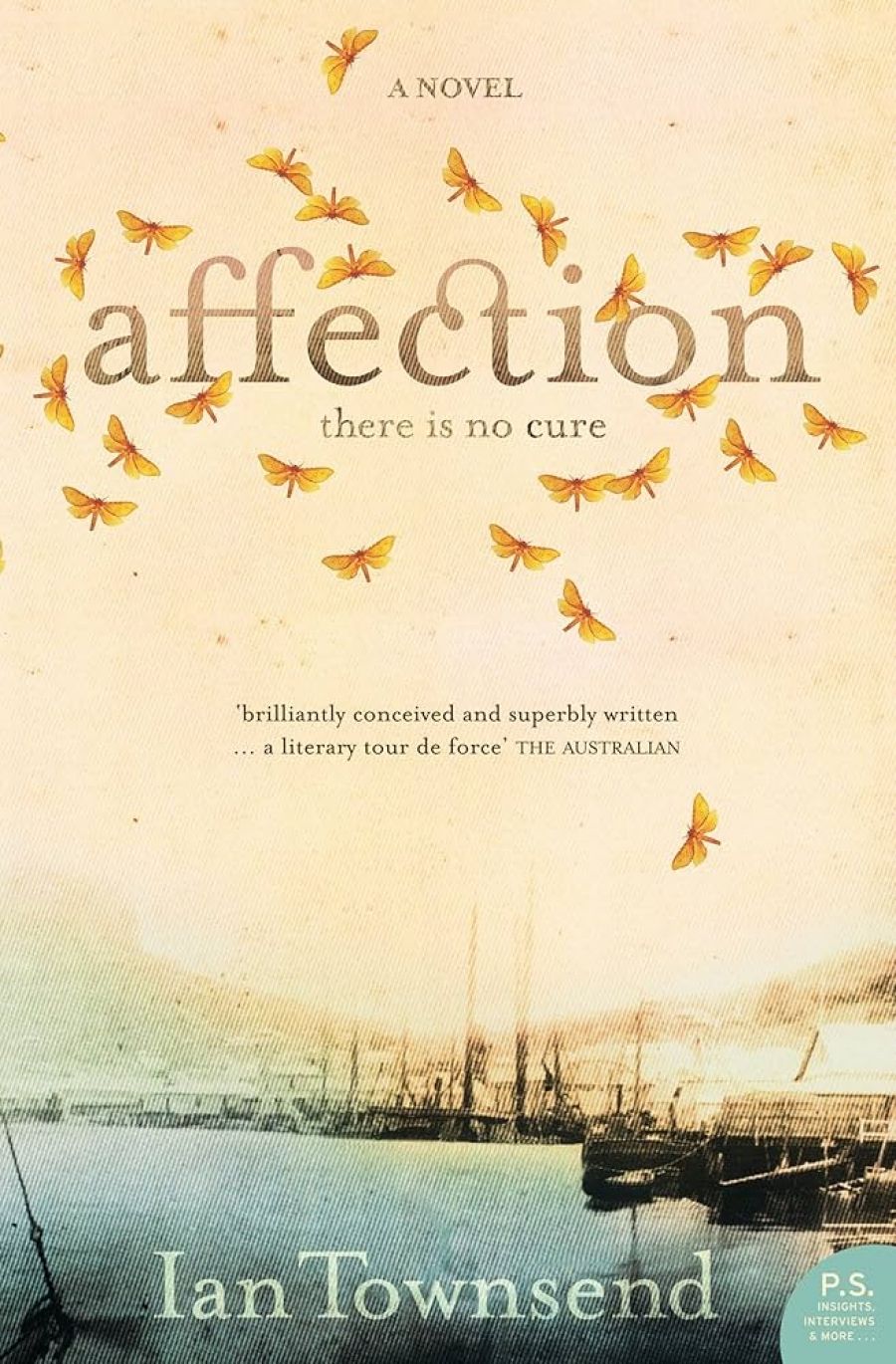
- Free Article: No
- Contents Category: Fiction
- Review Article: Yes
- Article Title: Grip of the vortex
- Online Only: No
- Custom Highlight Text:
Early in 1900, bubonic plague travelled by ship to Sydney, then erratically made its way up the coast. Ian Townsend’s accomplished first novel, Affection, traces the arrival of the plague in Townsville during the autumn of 1900. His story is factually based and is particularly concerned with three of the doctors who treated the outbreak: Linford Row, recently settled in the town as its municipal medical officer; long-term resident Ernest Humphry; and the English bacteriologist and butterfly collector Alfred Jefferis Turner. How they cope, not only with horrible and random deaths, but with politics and prejudice in North Queensland, is the dramatic core of the book.
- Book 1 Title: Affection
- Book 1 Biblio: Fourth Estate, $24.95 pb, 420 pp
- Book 1 Cover Small (400 x 600):

- Book 1 Cover (800 x 1200):

The story begins in 1921, at Moreton Bay, where Row is running an Asylum for Inebriates. A suspected case of plague takes him to Brisbane where he is reacquainted with Turner, whom he has not seen for twenty years. Each served on the Western Front in the Great War, as did Row’s son Allan, whom Turner introduced to lepidoptery and who is now also a doctor. This encounter opens up memories of the North that Row had hoped were long buried, and his narrative begins with the arrival of the Cintra in the port of Townsville, with plague on board as well as two Honourable (and troublesome) Members for Charters Towers. They – and particularly the former Queensland Premier Anderson Dawson – are keen to get ashore for hearings into a proposed railway line that will link Townsville to points south.
Row has taken this remote posting in part because he is still mourning one of his four children, Lillian, who died of diphtheria before she was three. He has come to a frontier town (but one that modern readers and travellers will find at once recognisable) where ‘the smell of fermented sugar and spilled molasses, the tang of explosives and sweet dead things from Ross Creek hung about east Flinders-street in dark swarms’. Row finds that ‘seasons have lost their logic’; sees ‘the streets unpaved, the water foul, and a frontier disregard for sobriety and manners’. This community, vain of its supposed independence of spirit, will be markedly resistant to, and resentful of, the necessary interference in its life by the plague doctors. As Row ruefully reflects, ‘in the North medical practice hadn’t caught up with medical science’. Hence local doctors Bacot and Routh are leading impediments to the work of containing the spread of plague, soon pneumonic as well as bubonic.
This means that, in essence, Affection tells a familiar story: of a cover-up fervently desired but that cannot be sustained; and of self-interest threatened by a danger to public health that many would rather deny, or call typhoid. Thus McCreely, the mayor of Townsville (hence Row’s employer), runs a saw mill and stands to profit from supplying timber for the southern railway. The Labor politician Dawson thinks, a touch more disinterestedly, of the jobs that it will bring for white unionised labour. Much more poignant are the attempts of individuals to refuse to believe that it is the plague with which they, or members of their family, might be stricken. In one of the more tense episodes in the novel, this denial leads to the siege of the Cockerill home, where a father protects his dying son from a trip to the plague hospital at Three Mile Creek.
Townsend tests our squeamishness with descriptions of the course and the conclusion of the disease. There is the deathbed scene with the Reverend Ward and the exhumation of the grave on Magnetic Island of the ship’s steward, Gard: ‘the body had swollen to fill the coffin, a fat snarling maniac in a narrow bath.’ Indifferently, the plague affects people across class divides and occupations: a publican and Mrs Duffy, president of the Women’s Christian Temperance Union. The authorities turn to rat-catching and slum clearing. The target for the latter is Townsville’s fledgling Chinatown, whose sanitary conditions Dr Turner (born in China) reckons as bad as those of Shanghai.
Numerous sub-plots are deftly managed by Townsend. One concerns Mrs Gard and her daughter, and Row’s anguished sense of responsibility for them. Another has to do with Dr Humphry’s intention to win the main race at Cluden. Cheekily, he calls it ‘Black Bird’ (in this town named for a notorious importer of Kanaka labour). He preferred ‘Quarantine’, but feared that that name might tip his hand. At times, Townsend overwrites, as when Row ‘felt the vortex grip me and drag me further towards its fluttering core’. But asperity is more characteristic of what he can do. This is Row’s reflection on his daughter’s death: ‘the grief of a rational man is endless.’ Affection is a fine début, which, at the risk of jinxing it, one might hail as The Great Townsville Novel.


Comments powered by CComment